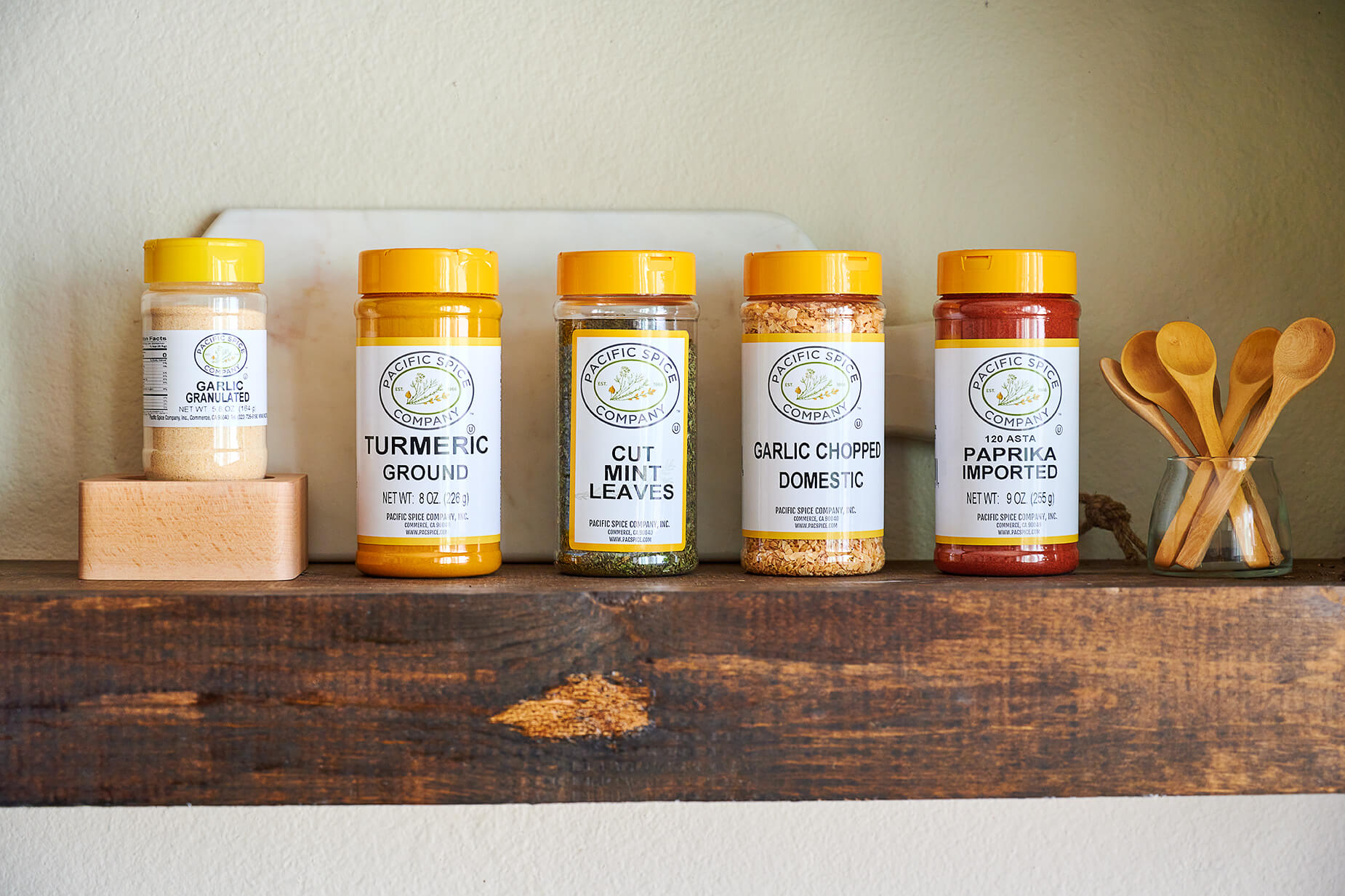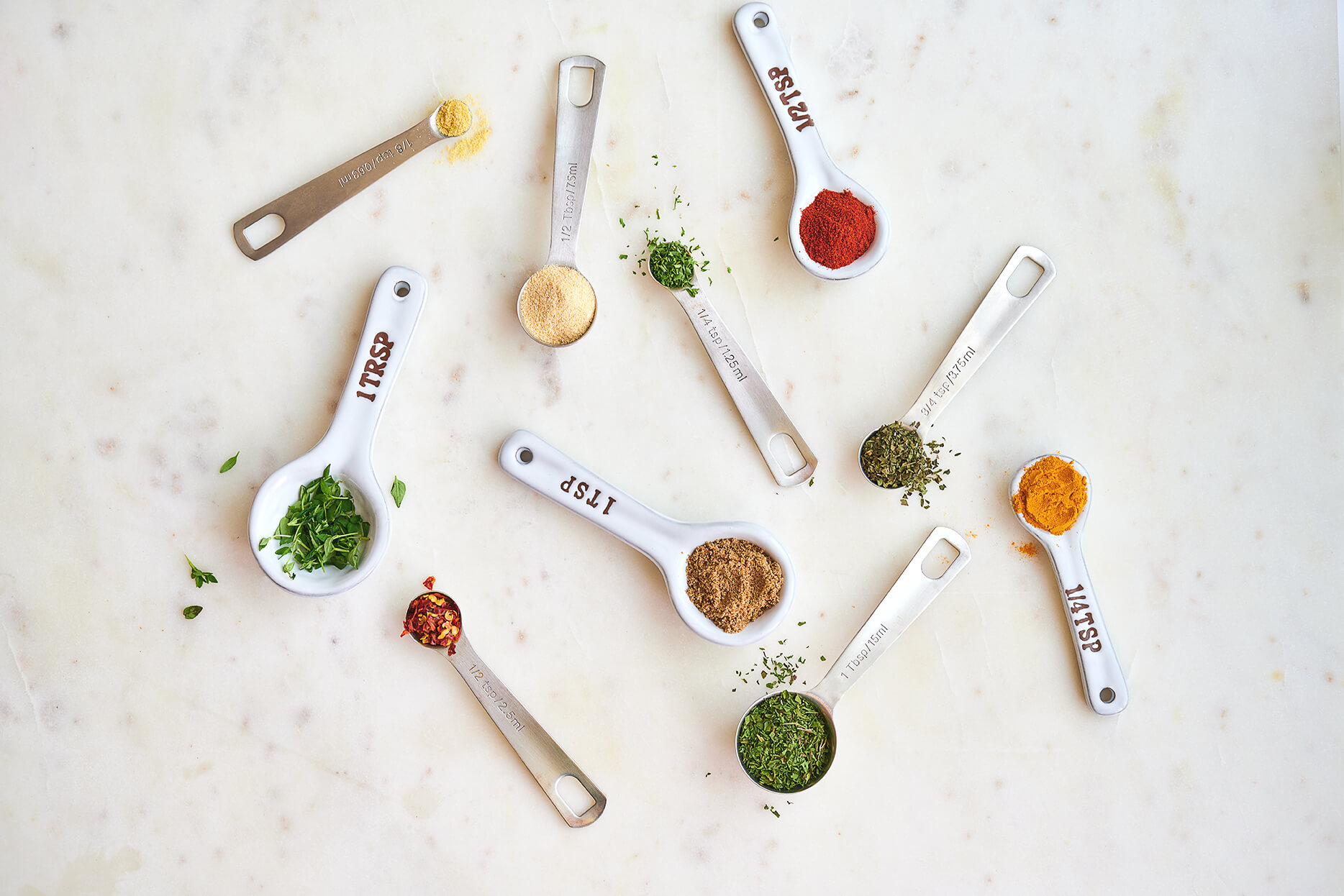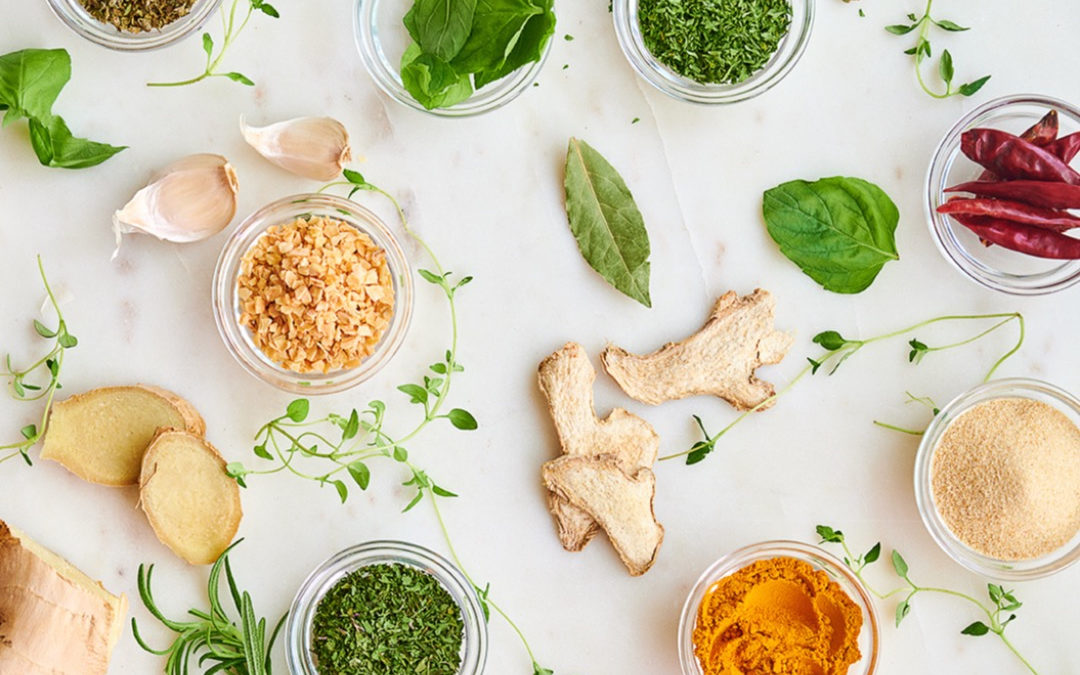As leaders in the spice industry, we believe everyone should know how to get the absolute most out of their herbs and spices. That’s why we pooled and distilled what we know about using, storing, and caring for spices into this simple how-to blog. In the time it takes you to read through, you’ll feel fully equipped to substitute fresh for dried herbs in recipes, and store spices with care to preserve their quality and flavor for longer, so that you can season your food to perfection.
Herbs and spices add natural aroma, flavor, and color to dishes. Get the most out of your herbs and spices with these tips!
Fresh vs. Dried Herbs
Chefs and Product Developers alike love to denote a rivalry between fresh and dried herbs. While our opinion is admittedly biased, we do believe that both fresh and dried herbs have their own place in the kitchen.
That said, here are a few reasons you might want to invest in dried herbs:
The Value of Dried Herbs
- Variety: Investing in a collection of various dried herbs allows you to consistently have many flavor options on hand without risk of fresh products going bad.
- Less is more: You can preserve shelf space and use less dried herbs than you would their fresh counterpart to achieve the same flavor goals.
- Flavor: Dried herbs are processed nearly immediately after harvesting, preserving their flavor at peak freshness.
- Shelf life: Dried herbs last a lot longer before expiring, when stored correctly.
- Consistency: There is far less variability with dried herbs than with fresh herbs, giving you flavor you can count on.
- Cost-efficiency: Dried herbs are more cost effective overall. You get more flavor for less product and alleviate risk of waste due to the longer shelf life of dried herbs.
How to Substitute Dried Herbs for Fresh Herbs
When a fresh herb is dried, the water is evaporated, leaving behind a more potent product. During the drying process, the organoleptic characteristics of the plant (color, aroma, and flavor) are maintained.
Because dried herbs have more concentrated flavor than fresh herbs, you’ll need to substitute less dried product to achieve the desired flavor.
If a recipe calls for fresh herbs, it’s easy to use substitute dried herbs. All you have to do is convert your recipe using a simple 3:1 ratio.
For example:
3tbsp Fresh Oregano = 1tbsp Dried Oregano
Or
1tbsp Fresh Oregano = 1tsp of Dried Oregano
If you’re ever unsure about how much dried spice you should use, start with less and add more to taste.
How To Store Herbs + Spices

There is nothing more disappointing to a flavor enthusiast than witnessing spices and herbs lose their flavor and freshness before their time. But the good news is, extending the shelf life of your dried herbs and spices is entirely in your power.
Here are the three environmental factors that most impact the shelf life of dried herbs and spices:
- Light: Herbs and spices are best kept in low light. You can limit light exposure by storing spices in a drawer or closed cupboard, and by storing them in dark amber glass containers.
- Humidity: Dry conditions are key to keeping herbs and spices fresh. When exposed to moisture , spices can clump together, and may eventually grow mold. Store them in dry conditions, away from the stove, off of the floors and walls, away from any water source, and in airtight containers. Make sure to always use a dry spoon when scooping spices out of their container.
- Temperature: Dried herbs and spices are best kept in conditions under 70° Fahrenheit.
If you store herbs and spices properly, they will stay fresh and flavorful for longer!
The Truth About Shelf-Life
If you have an inventory of dried spices and herbs on hand and you want to know if they’re still fresh, you should first check the expiration date. Because herbs and spices lose potency over time, it’s important to be mindful of the expiration date. You may also notice change in color, changes in texture and composition (caking and molding), and loss of fragrance and taste. These are all signs that it may be time to replace your product.
Spice Seasoning Tips

Now that you know how to substitute dried herbs for fresh herbs, store your spices and herbs properly to preserve their flavor and freshness, and check your spice inventory for optimal flavor and freshness, we will leave you with a few fun tips to help you boost flavor!
How to Maximize Flavor
One of the simplest and most effective ways to bring out the flavor of dry spices is to toast them. Adding heat maximizes the flavor of both whole and ground spices.
Anytime you toast spices, there is a risk of burning them. To safeguard against burning, add oil then a bit of liquid from the recipe (water, vinegar, stock, etc.) to the pan before adding the dry spices. Move the spices around in the pan to ensure they toast evenly and to minimize their risk of burning.
How to Season Properly
First, timing is everything! Sprinkling a little of this, and a little of that over an already cooked meal can add some flavor to the dish, but to get the most from your spices, it’s best to add them during the cooking process to draw out their essential oils and trap them in the food.
Start by adding hearty whole and coarsely ground ingredients such as cloves and ginger early, and then include the more fragile ingredients such as herbs and ground spices towards the end (about 10 minutes before the dish is done cooking) for optimal flavor.
Secondly, experiment with flavors, but be careful not to add too many spices or too much of any one spice as you’ll risk overwhelming or disguising the flavor of the dish. Always use a dry spoon to measure dry spices so as not to accidentally over-season; and remember that it’s much easier to add more flavor than it is to take it away.
When handling cold dishes, add spices and herbs a few hours before serving them if possible. This will allow their flavors to mix and marinate in the dish.
We hope you’ll use this guide to help you get the most out of the spices and herbs living in your spice cabinet!
At Pacific Spice we pride ourselves in producing only the purest products. With longstanding relationships and a rigorous supplier qualification and auditing process, Pacific Spice has maintained a focus on integrity, quality, and safety. Click the link to learn about our extensive quality assurance and quality control systems, and contact us if you have any questions about how to get the most out of our products.

